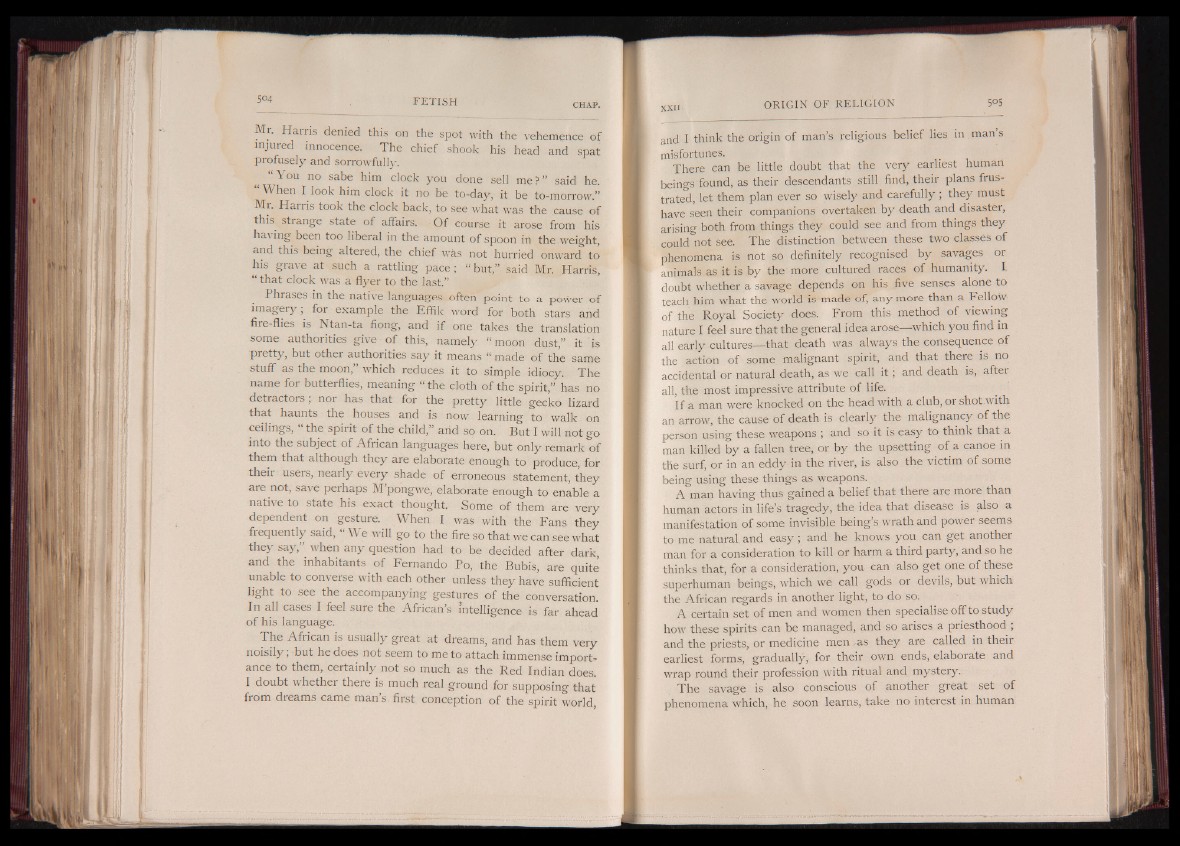
Mr. Harris denied this on the spot with the vehemence of
injured innocence. The chief shook his head and spat
profusely and sorrowfully.
“ You no sabe him clock you done sell me?” said he.
“ When I look him clock it no be to-day, it be to-morrow.”
Mr. Harris took the clock back, to see what was the cause of
this strange state of affairs. Of course it arose from his
having been too liberal in the amount of spoon in the weight,
and this being altered, the chief was not hurried onward to
his grave at such a rattling pace; “ but,” said Mr. Harris,
“ that clock was a flyer to the last.”
Phrases in the native languages often point to a power of
imagery; for example the Effik word for both stars and
fire-flies is Ntan-ta fiong, and if one takes the translation
some authorities give of this, namely 5 moon dust,” it is
pretty, but other authorities say it means “ made of the same
stuff as the moon,” which reduces it to simple idiocy. The
name for butterflies, meaning “ the cloth of the spirit,” has no
detractors, nor has that for the pretty little gecko lizard
that haunts the houses and is now learning to walk on
ceilings, “ the spirit of the child,” arid so on. But I will not go
into the subject of African languages here, but only remark of
them that although they are elaborate enough to produce, for
their users, nearly every shade of erroneous statement, they
are not, save perhaps M’pongwe, elaborate enough to enable a
native to state his exact thought. Some of them are very
dependent on gesture. When I was with the Fans they
frequently said, We will go to the fire so that we can see what
they say, when any question had to be decided after dark
and the inhabitants of Fernando Po, the Bubis, are quite
unable to converse with each other unless they have sufficient
light to see the accompanying gestures of the conversation.
In all cases I feel sure the African’s intelligence is far ahead
of his language.
The African is usually great at dreams, and has them very
noisily, but he does not seem to me to attach immense importance
to them, certainly not so much as the Red Indian does.
I doubt whether there is much real ground for supposing that
from dreams came man’s first conception of the spirit world,
and I think the origin of man’s religious belief lies in man’s
misfortunes.
There can be little doubt that the very earliest human
beings found, as their descendants still find, their plans frustrated,
let them plan ever so wisely and carefully ; they must
have seen their companions overtaken by death and disaster,
arising both from things they could see and from things they
could'not see. The distinction between these two classes of
phenomena is not so definitely recognised by savages or
• animals as it is by the more cultured races of humanity. I.
doubt whether a savage depends on his five senses alone to
teach him what the world is made of, any more than a Fellow
f of the Royal Society does. From this method of viewing
nature I feel sure that the general idea arose—-which you find in
all early cultures— that death was always the consequence of
the action of some malignant spirit, and that there is no
accidental or natural death, as we call i t ; and death is, after
all, the most impressive attribute of life.
If a man were knocked on the head with a club, or shot with
an arrow, the cause of death is clearly the malignancy of the
person using these weapons ; and so it is easy to think that a
man killed by a fallen tree, or by the upsetting of a canoe in
the surf, or in an eddy in the river, is also the victim of some
being using these things as weapons.
A man having thus gained a belief that there are more than
human actors in life’s tragedy, the idea that disease is also a
manifestation of some invisible being s wrath and power seems
to me natural, and easy; and he knows you can get another
man for a consideration to kill or harm a third party, and so he
thinks that, for a consideration, you can also get one of these
superhuman beings, which we call gods or devils, but which
the African regards in another light, to do so;
A certain set of men and women then specialise off to study
how these spirits can be managed, and so arises a priesthood ;
and the priests, or medicine men ms they are called in their
earliest forms, gradually, for their own ends, elaborate and
wrap round their profession with ritual and mystery.
The savage is also conscious of another great set of
phenomena which, he soon learns, take no interest in human